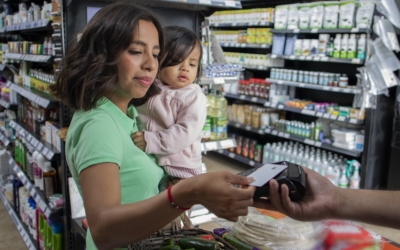I Can for Kids (iCAN) receives questions about how often and how long we offer support to food-insecure families. Based on our program evaluation, we know that 75% of our recipients only require short-term or sporadic support until they can overcome financial shocks or unexpected expenses. This means that 1 in 4 families requires longer term support due to major economic setbacks related to issues such as disability, ongoing unemployment, or relationship breakdown.
To learn more from our longstanding recipients, we followed up with a young father named Joe (not his real name) who previously shared his story about life with Tourette Syndrome and food insecurity. His family has accessed our grocery gift card program for more than a year and they were willing to share more insights about our approach. This blog highlights the key themes that emerged as we explored Joe’s experiences and perspectives.
Securing the basics
Due to the severity of his verbal and physical tics, Joe can’t secure regular or meaningful employment. He has to rely on a fixed income through government supports that rarely keep up with changes in inflation. In January 2024, the provincial government implemented a 4.25% benefit rate increase to help reduce the financial burden on Albertans who live with severe disabilities and cannot afford all their basic needs. Research shows that this type of income-based policy response offers the most potential to reduce food insecurity. Nonetheless, Joe noted how the soaring cost of living still makes it impossible for his family to make ends meet: “With the endless climb in inflation, it just feels like all the basics are being stripped away, bit by bit. We do all we can to reduce our heating and electricity costs, but my family still has to make a lot of difficult choices about food.”
Joe’s experience of increased financial constraint is entirely reflected in recent statistics and data. The federal government notes how the average annual income is lowest for Canadians with cognitive disabilities (like Tourette Syndrome) who must try to get by on half as much money as people without disabilities. The City of Calgary’s latest Inflation Review shows how all basic expenses continue to grow and electricity costs jumped by nearly 120% upon the conclusion of the 2023 provincial energy rebate program. In February 2024, Alberta faced the highest Consumer Price Index of all Canadian provinces including significant jumps in the price of many staples in Joe’s diet, such as fresh fruit, vegetables, and eggs. “All my family can do is make the best choices we can with what we have.” he conceded. “We greatly appreciate the way I Can for Kids helps with the harmful impacts of poverty because good food means our brains and bodies can function properly.”
Optimizing symptom relief
With consistent access to the iCAN grocery gift card program, Joe remains empowered to buy a variety of healthy diet choices and maintain control over what his family eats. He emphasized: “Food is my best medicine. I know that I have to buy whole foods, avoid most of the additives, and really limit sugar.” Over the years, Joe identified multiple food sensitivities that lead to flare ups in his TS symptoms. “Without a doubt, fresh foods help minimize the aggressive nature of my physical tics. When I used to pick up hampers from food programs, I just couldn’t eat most of the items I received, and I didn’t want to start exposing my young daughter to processed stuff that I would never normally feed her. Thankfully, someone working in one of those programs recommended I connect with I Can for Kids to access better support.”
Joe has also tried many medications to reduce his tics. Unfortunately, his body always resisted these treatments and he experienced the painful side effect of uncontrollable muscle spasms known as dystonia. He realized from a young age that healthy eating and regular physical activity would forever be two of the most effective ways to reduce the frequency and the intensity of his symptoms. “My tics are definitely connected to diet and exercise, but also to all the other inputs such as sleep and stress.” Joe explained. Thanks to the City of Calgary Fair Entry program, he benefits from a much lower fee to join a local recreation facility. This enables him to form meaningful social connections, maintain a regular exercise routine, and even inspire other members with his insight into effective weight training techniques.
Strengthening skill-building opportunities
Joe takes his job as a father very seriously, yet he performs the role with a deep sense of joy. “I realize I can’t offer my daughter all the same material things as other parents,” he acknowledged, “yet I also know that I contribute to her world by investing maximum effort to set her up for a healthy life.” Joe loves to cook, and he’s already started to teach his daughter some basic skills now that she’s turning four years old. He enjoys taking her grocery shopping because he views these outings as an interactive opportunity to tutor her on healthy eating concepts. He also wants her to understand how food grows and where it comes from before it reaches the shelves in the store. “The freedom to empower my kid with new knowledge and hands-on experiences is one of the best things about the grocery gift cards. I can’t teach her anything if I have to go to a building and pick up a box of donated food products. The I Can for Kids program not only recognizes the value of people, but also the value of healthy interactions with food.”
Boosting morale and emotional health
“I don’t want to understate the mental health benefits of my experience with I Can for Kids” Joe observed. “It makes my life and my child’s life so much easier when we can shop in a store where we know we are safe.” Individuals like Joe who exhibit strong verbal and physical tics often face the stressful reality of harsh judgments and knee-jerk reactions from people who fail to recognize the signs of Tourette Syndrome. Several times a year, Joe endures challenging incidents where strangers suddenly confront him aggressively in response to his involuntary twitches and verbal outbursts. “With the grocery gift cards, I’ve created a regular routine at the same stores where I can shop with confidence because the staff all know me, and they can help other customers understand my situation. This leads to a much better flow in my day-to-day life.”
Creating community and connection
Through our research, we know that our innovative service model strengthens the opportunity for our recipients to establish stronger connections with social service agencies. Joe works with Carya, a social impact agency in Calgary and one of iCAN’s longstanding collaborators. He noted how much he’s benefited by accessing some of the other services that Carya offers to their clients. In fact, he recently attended several sessions with one of their counsellors to help him work through the psychological distress of a hostile encounter with security staff in the community. “I really needed this support,” Joe explained, “but I simply couldn’t afford to access professional help through traditional methods. I feel a lot better after working with the counsellor.”
Joe’s daughter also enjoys the staff at Carya. She usually accompanies him to his regular meetings and check-ins where she can interact with others and learn more about the world around her. “She enjoys the people at the agency immensely.” Joe noted. “She sees them as a regular part of her little community, and it feels good to realize how much she will learn and benefit through her involvement. It’s a totally different experience than regular food programs. Rather than just driving up to an agency’s office for another transactional encounter, our experience with Carya and I Can for Kids is surrounded in humanity.”
Expressing our gratitude
iCAN would like to thank Joe for investing more of his time to share insightful details about his ongoing journey with food insecurity. In a world that tends to quickly misjudge both disabilities and food insecurity, we’re incredibly grateful for the volunteers, donors, funders, champions, and supporters who recognize the considerable value of our income-based approach. It’s encouraging to know that our efforts – and your generous donations – lead to an array of health benefits that promote financial, emotional, and physical well-being for kids and families.
To join iCAN’s expanding list of champions, check out the ways you can get involved or donate.
To learn more about I Can for Kids and their unique approach to childhood food insecurity, visit www.icanforkids.ca
About Donald Barker
Donald Barker has worked as a registered dietitian for more than 25 years. He also has a professional background in communications and has long advocated for populations who face adverse, unjust, or systemic barriers that lead to higher rates of poor social, mental, emotional, and physical health outcomes. Donald currently volunteers as an Advisor with iCAN to support our transition towards evidence-based approaches that help improve the well-being of children in Calgary who live in low-income and food-insecure households.
About I Can for Kids Foundation
I Can for Kids works closely with multiple agency partners to target and distribute grocery gift cards to food-insecure families who are most in need. The iCAN grocery gift card program is a more dignified and inclusive approach to dealing with food insecurity, allowing families to shop where everyone else shops and to choose foods that are appropriate for their health and cultural needs. Explore their website to discover more about iCAN’s impact over the years.
For more information and media inquiries, please contact iCAN Executive Director, Bobbi Turko at bobbi@icanforkids.ca.




